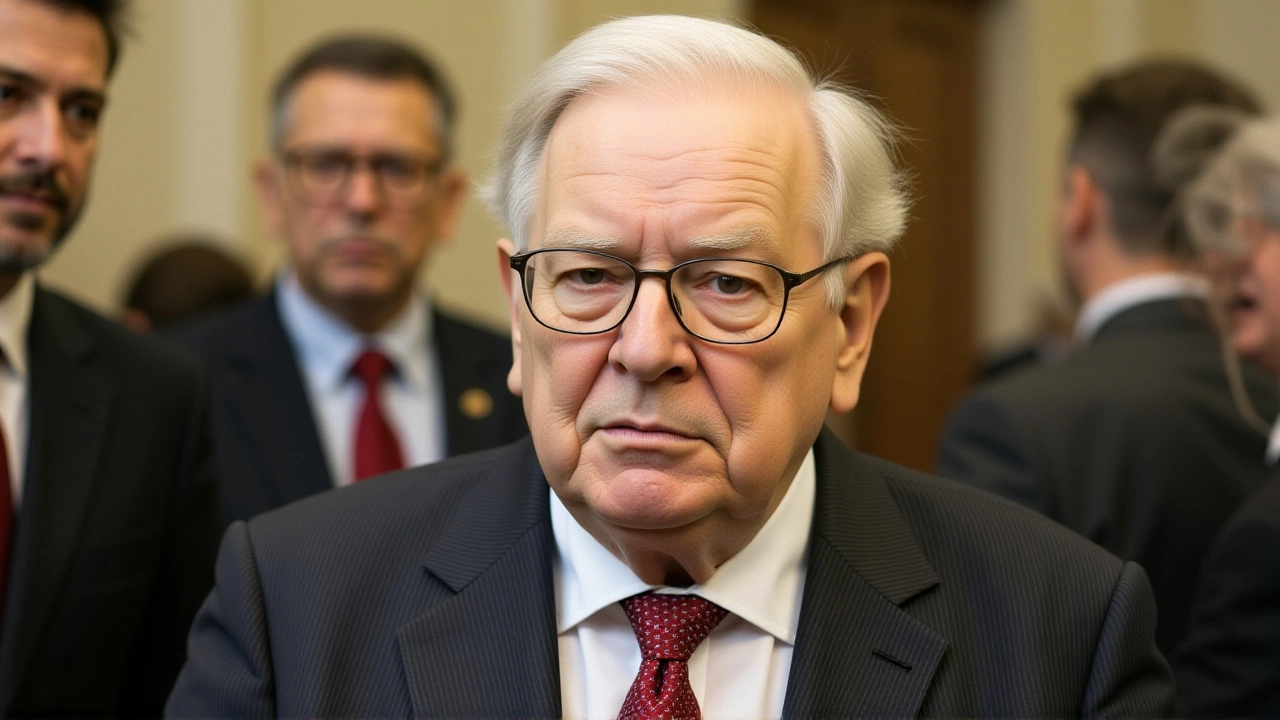Buffett’s $4.3 Billion Bet on Alphabet Signals AI Investment Turnaround

When Warren Buffett, the 94-year-old Oracle of Omaha, quietly built a $4.3 billion stake in Alphabet Inc. during the third quarter of 2025, he didn’t just buy shares—he rewrote a rulebook written over seven decades. The Berkshire Hathaway portfolio update, filed with the SEC on September 30, 2025, revealed 17.8 million shares of Alphabet Class A stock had been acquired, marking the most dramatic departure from Buffett’s long-standing aversion to tech stocks. This isn’t just a new position. It’s a philosophical pivot.
A Legacy Reconsidered
Buffett spent his career avoiding companies he couldn’t understand—or couldn’t predict. He passed on Microsoft in the ’90s. He skipped Amazon for years. Even Apple, now his largest holding, only won his trust after it became a consumer staple, not a hardware gamble. But Alphabet? The company behind Google Search, YouTube, Android, and now Gemini AI? That was a different kind of beast. One that didn’t fit the "wide moat" mold he once prized—until now."He’s not buying a search engine," said Tom Russo, 73, a veteran investor and general partner at Gardner Russo & Quinn LLC in Philadelphia. "He’s betting on a company that can lose money on purpose—and still win."
That’s the twist. Buffett’s team didn’t buy Alphabet because it’s profitable today. They bought it because it’s willing to bleed cash now for dominance tomorrow. Alphabet is projected to spend over $90 billion in 2025 on AI infrastructure, cloud computing, and research labs—more than most Fortune 500 companies earn in a year. Yet its balance sheet remains a fortress: $237 billion in cash and equivalents, $76 billion in free cash flow last year, and revenue up 14% year-over-year.
"Capacity to Suffer"—The New Moat
Russo, who’s known for his deep dives into corporate culture, coined the phrase "capacity to suffer" to describe Alphabet’s unusual patience. Unlike companies pressured to deliver smooth quarterly earnings, Alphabet openly funds moonshots—like self-driving cars through Waymo, quantum computing, and AI health diagnostics—that might not pay off for a decade. And Wall Street? It’s not complaining."Never should somebody give their consumer the opportunity, the incentive to look elsewhere," Russo paraphrased the late Charlie Munger, Buffett’s longtime partner who died in November 2023. That’s the real insight. Alphabet hasn’t just built a search engine. It’s built an ecosystem so embedded in daily life—email, maps, ads, phones, video—that switching feels like rewiring your brain.
Even with rivals like OpenAI LLC (backed by Microsoft Corporation) and Perplexity AI Inc. gaining traction, Alphabet’s moat isn’t crumbling—it’s expanding. OpenAI’s estimated $1.2 billion annualized revenue? That’s less than 10% of what Alphabet pulls in from ads alone. And while ChatGPT can write poetry, it can’t match Google’s 92% global search market share—or its ability to turn every click into a data point that feeds its next AI model.

The Bigger Risk Isn’t AI—It’s the Dollar
Here’s what’s surprising: Russo doesn’t worry about AI stocks crashing. He worries about the U.S. debt. He worries about the dollar losing its global anchor status. "The real market risk," he told Business Insider on November 18, 2025, "isn’t a bubble in AI—it’s a collapse in confidence in American fiscal policy."That’s why Buffett’s move isn’t just about tech. It’s about stability. Alphabet’s cash pile rivals Berkshire’s. Its revenue streams are global, diversified, and inflation-resistant. When central banks hike rates, advertisers still need to reach customers. When the economy slows, people still search for answers. When chaos hits, Google remains the first place they go.
And now, 27% of Buffett’s $320 billion portfolio is in AI-linked stocks: Alphabet, NVIDIA Corporation, and Amazon.com Inc.. The rest? Insurance, railroads, energy, and consumer brands—old economy anchors. But the new engine? It’s AI. And Alphabet is the fuel.

What’s Next for Berkshire?
Buffett’s two co-managers—Ted Weschler, 63, and Todd Combs, 54—are now the architects of this new era. They’ve quietly been buying tech for years, but Alphabet was their biggest signal yet. If they’re right, this could be the start of a broader tech renaissance at Berkshire. Maybe Microsoft. Maybe Salesforce. Maybe even a stake in a generative AI startup.One thing’s clear: Buffett didn’t change his mind because AI is hot. He changed it because he saw something deeper: a company that doesn’t chase quarterly wins but builds century-long advantages. That’s not tech investing. That’s Berkshire investing.
Frequently Asked Questions
Why did Warren Buffett change his mind about tech stocks?
Buffett never disliked technology—he disliked unpredictability. Alphabet changed the game by proving it could generate massive cash flow while funding long-term AI bets without panicking investors. Unlike startups, it has a proven business model, global scale, and a balance sheet strong enough to weather any storm. That’s the classic Buffett criteria—just applied to a new kind of company.
How does this affect regular investors?
For individual investors, Buffett’s move validates AI as a legitimate long-term play—not just a hype cycle. It signals that even the most conservative giants see AI as infrastructure, not a fad. This could encourage broader institutional adoption, potentially stabilizing valuations. But it also raises the bar: only companies with real cash flow and strategic patience will survive the next wave.
Is Alphabet’s AI spending sustainable?
Yes—because it’s not just spending. It’s reinvesting. Alphabet generated $76 billion in free cash flow last year, and its advertising business still accounts for over 80% of revenue. Even with $90 billion in planned 2025 capex, its cash reserves are sufficient to fund the AI push without debt. Plus, AI is already improving ad targeting, reducing cloud costs, and automating customer service—all of which will boost margins over time.
What’s the risk if AI doesn’t deliver?
The risk isn’t failure—it’s stagnation. If Alphabet’s AI innovations don’t create new revenue streams beyond ads, growth could slow. But even then, its core business is so dominant that a plateau would still make it one of the world’s most valuable companies. Unlike startups betting everything on AI, Alphabet has a safety net: search, YouTube, Android, and cloud services that pay the bills while it experiments.
Why is this a bigger deal than Apple or Microsoft investments?
Apple and Microsoft fit Buffett’s old playbook: predictable, consumer-driven, with physical or enterprise products. Alphabet is different. It’s a platform company building the future’s operating system—literally. Its AI isn’t a feature; it’s the foundation. Buffett didn’t just invest in a company. He invested in the next layer of digital infrastructure. That’s a generational shift.
Could this trigger a wave of tech buying by other value investors?
Absolutely. Buffett’s move is the ultimate signal. If the man who once called tech stocks "too hard to predict" now sees Alphabet as a moated, cash-generating giant, others will follow. We’re already seeing hedge funds and pension managers re-evaluate AI stocks not as speculative bets, but as essential infrastructure plays. The value investing playbook is evolving—and Alphabet is leading the way.